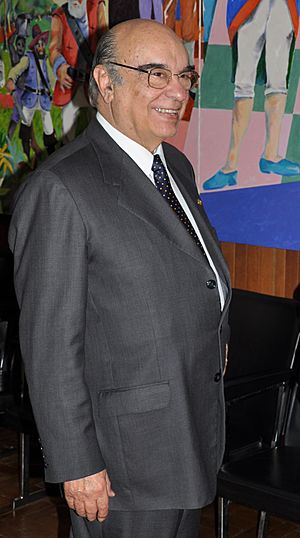Bonifácio José Tamm de Andrada facts for kids
Quick facts for kids
Bonifácio José Tamm de Andrada
|
|
|---|---|

Tamm de Andrada in October 2011
|
|
| Federal Deputy for Minas Gerais | |
| In office 1 February 1979 – 31 January 2019 |
|
| State Deputy of Minas Gerais | |
| In office 1959–1975 |
|
| Personal details | |
| Born | 14 May 1930 Barbacena, Minas Gerais, Brazil |
| Died | 5 January 2021 (aged 90) Belo Horizonte, Minas Gerais, Brazil |
| Political party | National Democratic Union (1950–1965) National Renewal Alliance (1966–1979) Democratic Social Party (1980–1993) Brazilian Labour Party (1994–1996) Brazilian Social Democracy Party (1997–2017) Democrats (2018–2021) |
Bonifácio José Tamm de Andrada (born May 14, 1930 – died January 5, 2021) was an important Brazilian politician. He was also a law expert, a university professor, a political scientist, and a journalist.
Born in Barbacena, a city in Minas Gerais, Brazil, he was part of many different political parties during his long career.
He served as a councillor for Barbacena from 1954 to 1958. After that, he became a state deputy in Minas Gerais from 1959 to 1975. This means he held positions in government for sixty years! He even ran for vice president of Brazil in 1989.
From 1979 to 2019, he was a member of the Chamber of Deputies, which is like the main law-making body in Brazil. He served for ten terms in a row.
Contents
Bonifácio Andrada's Political Journey
Bonifácio Andrada helped start the National Campaign for Free Educandários (CNEC) in the 1950s. This group worked to provide free education. He studied law at the Pontifical Catholic University of Rio de Janeiro. After finishing his studies, he worked as a lawyer in his hometown.
Early Political Roles
He was elected as a city councilor for Barbacena from 1954 to 1958. Then, he became a state deputy in Minas Gerais for four terms, from 1959 to 1975. He was part of different political parties during this time, including the UDN and the ARENA.
Serving as a Federal Deputy
Bonifácio Andrada became a federal deputy for Minas Gerais in 1979. He served for ten terms, which is a very long time! He was elected by different parties over the years, such as ARENA, the Social Democratic Party (PDS), the Brazilian Labour Party (PTB), and the Brazilian Social Democracy Party (PSDB).
He also helped found a weekly newspaper called Correio da Serra in Barbacena in 1954. He was the editor-in-chief for many years.
Key Moments in His Career
In 1984, he was not present for a vote on the Dante de Oliveira Amendment. This amendment wanted direct elections for the President of Brazil. He was also part of the group that wrote the 1988 Constitution for Brazil.
As a state deputy, he led the Legislative Assembly of Minas Gerais in 1968. As a federal deputy, he led the Constitution and Justice Commission in the Chamber of Deputies in Brasília. Until early 2021, he was the oldest federal deputy in Brazil.
In the 1989 presidential election, he ran for vice-president with Paulo Maluf. They finished in fifth place. In 2014, he was re-elected as a federal deputy. He voted in favor of the impeachment process for President Dilma Rousseff. He also supported a plan to limit public spending.
In 2017, he voted against opening an investigation into then-President Michel Temer. Later that year, he was chosen to lead a report on a second complaint against President Temer. He recommended that this complaint be rejected.
Public Service Roles
Bonifácio Andrada started his public life working for the Minister of Agriculture in 1955. After serving in elected positions, he was appointed as the Secretary of State for Education and Culture in Minas Gerais in 1965. Later, he became the Secretary of Interior and Justice for Minas Gerais from 1974 to 1977. He also served as the Secretary of Administration and Human Resources from 1994 to 1997.
Family Life
Bonifácio Andrada was the son of José Bonifácio Lafayette de Andrada and Vera Raymunda Tamm de Andrada. He was also the brother of the late deputy José Bonifácio Tamm de Andrada. His family has a long history in Brazil, as he was a descendant of the important statesman José Bonifácio de Andrada e Silva.
He was married to Amália Borges de Andrada. They had 8 children, some of whom also became politicians or held important legal positions. He was a Roman Catholic.
Bonifácio Andrada passed away on January 5, 2021, at the age of 90. He died from complications related to COVID-19 during the COVID-19 pandemic in Brazil.
Books and Writings
Bonifácio Andrada wrote several books and essays during his life. Some of his published works include:
- Ideias e propostas para um Brasil livre (Ideas and proposals for a free Brazil)
- Parlamentarismo e a evolução brasileira (Parliamentarism and Brazilian evolution)
- A educação e segurança nacional (Education and national security)
- Os poderes da Assembleia Nacional Constituinte (The powers of the National Constituent Assembly)
- Constituição, regime democrático e revisão constitucional (Constitution, democratic regime, and constitutional review)
- Ciência política, ciência do poder (Political science, science of power)
Awards and Honors
Throughout his career, Bonifácio Andrada received many awards and honors. Some of them are:
- Medal of Inconfidência, from the government of Minas Gerais (1966)
- Medal Santos Dumont, from the government of Minas Gerais (1968)
- Medal Santos Dumont, from the Brazilian Air Force (1969)
- Medal Alferes Tiradentes, from the Military Police of Minas Gerais (1977)
- Baron of Rio Branco Order of Merit (1980)
- Legislative Merit of Minas Gerais (1982)
- Merit from the Chilean government
- Merit from the Superior Labor Court
- Army Military Merit Medal
- Military Merit of the Navy
- Military Merit of Aeronautics
See also

